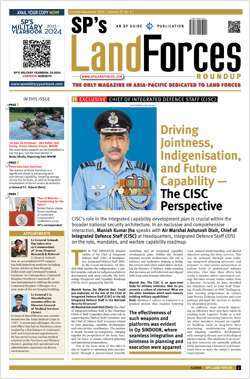INDIAN ARMED FORCES CHIEFS ON OUR RELENTLESS AND FOCUSED PUBLISHING EFFORTS

The insightful articles, inspiring narrations and analytical perspectives presented by the Editorial Team, establish an alluring connect with the reader. My compliments and best wishes to SP Guide Publications.

"Over the past 60 years, the growth of SP Guide Publications has mirrored the rising stature of Indian Navy. Its well-researched and informative magazines on Defence and Aerospace sector have served to shape an educated opinion of our military personnel, policy makers and the public alike. I wish SP's Publication team continued success, fair winds and following seas in all future endeavour!"

Since, its inception in 1964, SP Guide Publications has consistently demonstrated commitment to high-quality journalism in the aerospace and defence sectors, earning a well-deserved reputation as Asia's largest media house in this domain. I wish SP Guide Publications continued success in its pursuit of excellence.
- Appointments Committee of Cabinet approves one-month extension in service of Chief of the Army Staff
- Prime Minister witnesses 'Bharat Shakti' – a Tri-Services Firing and Manoeuvre Exercise in Pokhran, Rajasthan
- Interim Defence Budget 2024-25 — An Analysis
- Union Defence budget 2024
- Indian Army: In quest of greater firepower and policy recommendations for gaps
- Indian Army Annual Press Conference 2024
- Tata Boeing Aerospace Delivers 250 AH-64 Apache Fuselages, Manufactured in India
Deciphering the US Pakistan Tango
Washington's renewed embrace of Pakistan raises questions for India as geopolitics, security, and old alliances collide
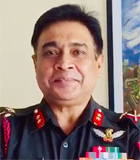 |
The Author is former Chief of Staff of a frontline Corps in the North East and a former helicopter pilot. He earlier headed the China & neighbourhood desk at the Defence Intelligence Agency. He retired in July 2020 and held the appointment of Addl DG Information Systems at Army HQ. |
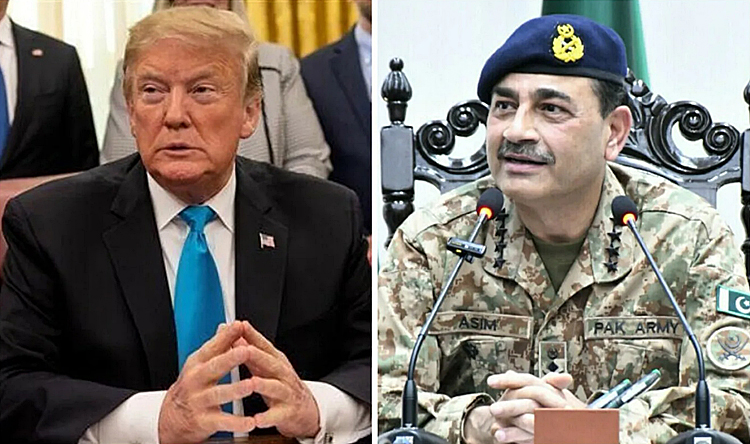
The rising crescendo of US Pakistan bonhomie since mid-May Op Sindoor is being depicted by many former diplomats, policy honchos, eminent columnists, TV personalities, social media influencers and not to forget, the 'secular brigade' politicos as a sign of failure of the Modi government's approach to foreign policy. The global fountainhead of terror, Pakistan, has emerged as one of the most trusted and close partners of the world's most powerful and prosperous nation, the United States. The world's largest democracy, India on the other hand, is on the American crosshairs, saddled with a punishing 50 per cent tariff and threatened with more punitive actions if it continues to buy Russian crude and import Russian weapon systems.
Shifting Sands of Geopolitics
Days after Pakistani Army Chief Asim Munir threatened to "take down half the world" with its nuclear weapons if its existence is threatened", a former Pentagon official Michael Rubin said, "Asim Munir is Osama Bin Laden in a suit and there will be no amount of concession that will be given to Pakistan that is going to change his ideology or the Pakistani elite he represents."
The global fountainhead of terror, Pakistan, has emerged as one of the most trusted and close partners of United States, the world's most powerful nation
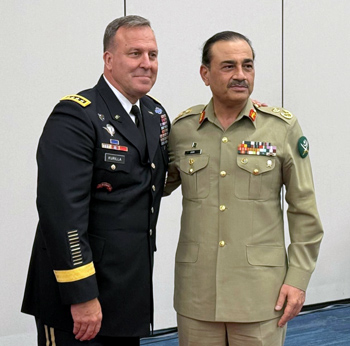
Munir's threat came at a black-tie dinner in Tampa, Florida which houses the US Central Command (CENTCOM). Munir was there to attend the farewell of the retiring Commander CENTCOM General Michael Kurilla, who had previously termed Pakistan a "phenomenal partner" in counter-terrorism. Two weeks prior, Pakistan President Asif Ali Zardari had bestowed one of its highest military honours, the Nishan-e-Imtiaz (Military), to General Michael Kurilla in a high-profile ceremony at the Presidential Palace in Islamabad. The string of developments suggests a growing military and strategic engagement between Pakistan and the US and a return to the old Western policy of hyphenating India and Pakistan.
If this hyphenation wasn't enough, Trump has continued his toxic diatribe against India. Unlike Munir who so very subserviently endorsed Trump for a Nobel Peace prize before joining him for lunch at the White House in June, India not only countered his claims of having crafted a ceasefire between two nuclear nations, but also has the temerity to defy his diktat to stop buying Russian oil or open up its markets for American agricultural and dairy products. Therefore, it is left to the judgement of the sections of India's intelligentsia who blame Prime Minister Modi or Foreign Minister Jaishankar for the current situation in Indo-US relationship to reflect, rethink and re-evaluate lest they slide into becoming, consciously or unconsciously, an extension of the American Deep State.
India on the other hand, is on the American crosshairs, saddled with a punishing 50 per cent tariff and threatened with more punitive actions if it continues to buy Russian crude and import Russian weapon systems
The reason for such open antagonism by these intellectuals towards India's policy choices and Indian leadership can be many, ranging from generous funding of their respective NGOs by the likes of USAID or Carnegie Foundation or Ford Foundation, funding of their media houses, think tanks and activist groups or awarding so-called merit scholarship to their children for study in American Ivy League universities. In these matters, it is difficult for any other nation to compete with the US Deep State due to the unique position of the US Dollar as the world's reserve currency and its weaponisation since 1971 by the USA. As a result, it keeps printing dollars to distribute its largesse and peddle influence. I have personally enjoyed the American generosity while at Fort Rucker Alabama for the Advance Aviation Course in 1997 and at the Near East South Asia Centre for Strategic Studies at the NDU Washington DC in 2014, comfortably ensconced in a suite room of the Hilton Doubletree in Crystal City opposite the Pentagon. A sense of gratitude and obligation, if further nurtured can impact sane judgement.
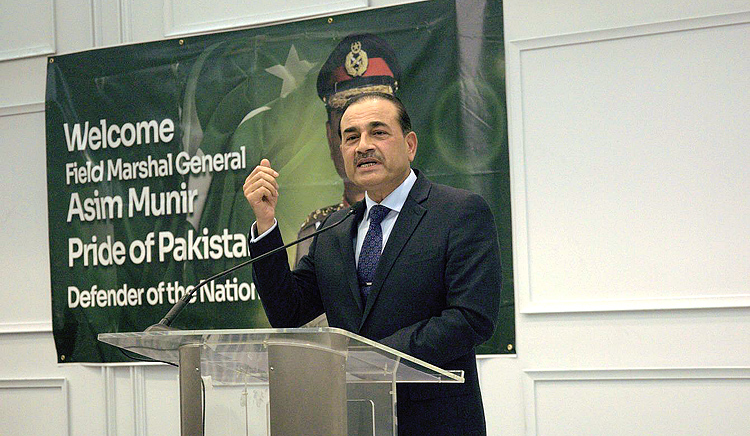
Historical Depth of US-Pakistan Relations
All said, it appears that Pakistan is playing its hand deftly, even if it may be fleeting or illusionary. Pakistan continues to court its "Higher than the mountains and deeper than the ocean" ally China though the latter seeks direct talks with Baloch groups to secure its $62 billion CPEC investments, aiming to reduce insurgent attacks and ensure progress on key projects, bypassing Pakistan Army. This Chinese approach is likely to face a serious challenge now as the US on August 11, 2025 designated The Baluchistan Liberation Army (BLA) and its alias, The Majeed Brigade, as a Foreign Terrorist Organisation (FTO), and added the Majeed Brigade as an alias to BLA's previous Specially Designated Global Terrorist (SDGT) designation.
For years, Pakistan has been locked in a fierce battle with a separatist insurgency in mineral-rich Baluchistan. The BLA, an armed insurgent group, has been at the forefront of this conflict, claiming to be fighting for an independent Baluchistan and accuses the Pakistani state of resource exploitation. The group has carried out numerous deadly attacks on Pakistani security forces and key infrastructure, including suicide bombings at the Gwadar Port and the hijacking of the Jaffar Express train.
Days after Pakistani Army Chief Asim Munir threatened to "take down half the world", a former Pentagon official said, "Asim Munir is Osama Bin Laden in a suit"
The FTO designation by the US State Department is being touted as a major victory by Munir who has consistently accused India of running a "proxy war" in the region. For the US, it may have been driven by its desire to take control of Baluchistan's vast potential reserves of oil and minerals. In the days to come, it would be interesting to watch the developments in Baluchistan as the two competing big powers, the US and China confront each other in the region to advance and protect their interests.
The trail of close US Pakistan strategic embrace or the hosting of a Pakistani Field Marshal by an American President isn't new. Way back on July 11, 1961, the US First Lady Jacqueline Kennedy had choreographed a summit between President John F. Kennedy and Pakistani President Field Marshal Mohammad Ayub Khan at Mount Vernon, the home of America's first president, George Washington. Pakistan was an important partner for the US to the containment of the Soviet Union and China. The Central Intelligence Agency (CIA) flew U2 surveillance flights from Pakistani bases to monitor China's emerging nuclear arsenal. The CIA also secretly supported Tibetan rebels fighting for independence from an airbase in what was then East Pakistan (now Bangladesh). The close bonding between the US Deep State and the Pakistan army has thus been nurtured over six decades and any linkages to India's recent policies regarding Russian oil imports and difficulties in trade negotiations are only subterfuge being used by the US.
The string of developments suggests a growing military and strategic engagement between Pakistan and the US and a return to the old Western policy of hyphenating India and Pakistan
The Harsh Realities of Power Politics
Pakistan faces a delicate and difficult internal situation, in terms of economy as well as security. Its less than $4.5 billion foreign exchange reserves can barely meet its two-months imports bill. Including the current tranche, Pakistan has so far availed 25 IMF bailouts. It badly needs some financial handholding from the US as China has declined to offer any help considering its own CPEC is in doldrums. The security situation is turning grimmer by the day. The Taliban regime in Afghanistan which was so methodically raised, trained and groomed by Pakistan with American help to push out the Soviets from Afghanistan in the eighties, is openly adversarial now; supporting the Tehrik-i-Taliban Pakistan which is seeking to break away the Khyber Pakhtunkhwa province. In any case, the Afghanistan regime does not recognise the Durand Line demarcating its borders with Pakistan. To add to the woes, the PoK has witnessed massive protests against the Pakistan regime due to neglect and underdevelopment.
The US Pakistan tango is in essence a conversion of interests between the American Deep State and the Pakistani army establishment. The US is able to sugar-coat and burnish its activities in sophistication due to its unique military and economic prowess while the other must threaten in the most rustic manner to gain some attention. The 6th and 9th August 1945 bombing of Hiroshima and Nagasaki America at the fag end of WW II left over 2,00,000 dead, snuffing out lives of children being escorted to their school buses and elderly sipping morning tea, obliterated entire cities, left lasting radiation impact on the human body for generations and a deep scar on humanity difficult to erase. The rest of the world must not forget these horrors of Hiroshima and Nagasaki and take a serious note of those threatening to take "half the world with them."





